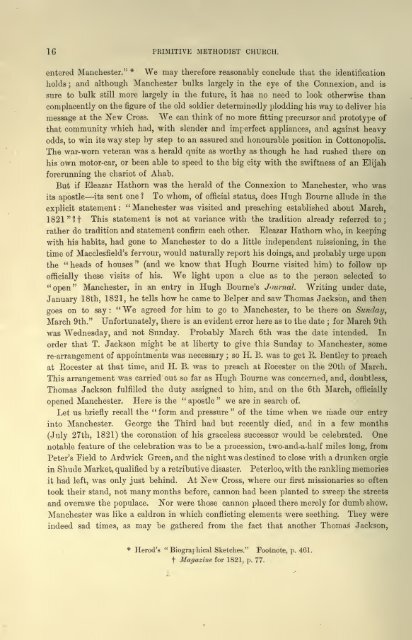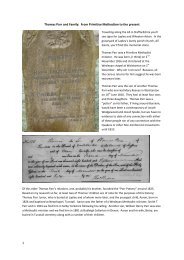Vol 2, pages 1-100 - My Primitive Methodist Ancestors
Vol 2, pages 1-100 - My Primitive Methodist Ancestors
Vol 2, pages 1-100 - My Primitive Methodist Ancestors
You also want an ePaper? Increase the reach of your titles
YUMPU automatically turns print PDFs into web optimized ePapers that Google loves.
16 PRIMITIVE METHODIST CHURCH.<br />
entered Manchester." *<br />
We may therefore reasonably conclude that the identification<br />
holds; and although Manchester bulks largely in the eye of the Connexion, and is<br />
sure to bulk still more largely in the future, it has no need to look otherwise than<br />
complacently on the figure of the old soldier determinedly plodding his way to deliver his<br />
message at the New Cross. We can think of no more fitting precursor and prototype of<br />
that community which had, with slender and imperfect appliances, and against heavy<br />
odds, to win its way step by step to an assured and honourable position in Cottonopolis.<br />
The war-worn veteran was a herald quite as worthy as though he had rushed there on<br />
his own motor-car, or been able to speed to the big city with the swiftness of an Elijah<br />
forerunning the chariot of Ahab.<br />
But if Eleazar Hathorn was the herald of the Connexion to Manchester, who was<br />
its apostle<br />
its sent one 1 To whom, of official status, does Hugh Bourne allude in the<br />
explicit statement " Manchester was visited and : preaching established about March,<br />
1821"?t This statement is not at variance with the tradition already referred to;<br />
rather do tradition and statement confirm each other. Eleazar Hathorn who, in keeping<br />
with his habits, had gone to Manchester to do a little independent missioning, in the<br />
time of Macclesfield's fervour, would naturally report his doings, and probably urge upon<br />
the "heads of houses" (and we know that Hugh Bourne visited him) to follow up<br />
officially these visits of We his. light upon a clue as to the person selected to<br />
" "<br />
open Manchester, in an entry in Hugh Bourne's Journal. Writing under date,<br />
January 18th, 1821, he tells how he came to Belper and saw Thomas Jackson, and then<br />
goes on " to say We : agreed for him to go to Manchester, to be there on Sunday,<br />
March 9th." Unfortunately, there is an evident error here as to the date for March 9th<br />
;<br />
was Wednesday, and not Sunday. Probably March 6th was the date intended. In<br />
order that T. Jackson might be at liberty to give this Sunday to Manchester, some<br />
re-arrangement of appointments was necessary so H. B. was to<br />
;<br />
get R. Bentley to preach<br />
at Rocester at that time, and H. B. was to preach at Rocester on the 20th of March.<br />
This arrangement was carried out so far as Hugh Bourne was concerned, and, doubtless,<br />
Thomas Jackson fulfilled the duty assigned to him, and on the 6th March, officially<br />
opened Manchester. Here is the " apostle " we are in search of.<br />
Let us briefly recall the "form and pressure" of the time when we made our entry<br />
into Manchester. George the Third had but recently died, and in a few months<br />
(July 27th, 1821) the coronation of his graceless successor would be celebrated. One<br />
notable feature of the celebration was to be a procession, two-and-a-half miles long, from<br />
Peter's Field to Ardwick Green, and the night was destined to close with a drunken orgie<br />
in Shude Market, qualified by a retributive disaster. Peterloo, with the rankling memories<br />
it had left, was only just behind. At New Cross, where our first missionaries so often<br />
took their stand, not many months before, cannon had been planted to sweep the streets<br />
and overawe the populace. Nor were those cannon placed there merely for dumb show.<br />
Manchester was like a caldron in which conflicting elements were seething. They were<br />
indeed sad times, as may be gathered from the fact that another Thomas Jackson,<br />
* Herod's<br />
" Biographical Sketches." Footnote, p. 461.<br />
t Magazine for 1821, p. 77.



